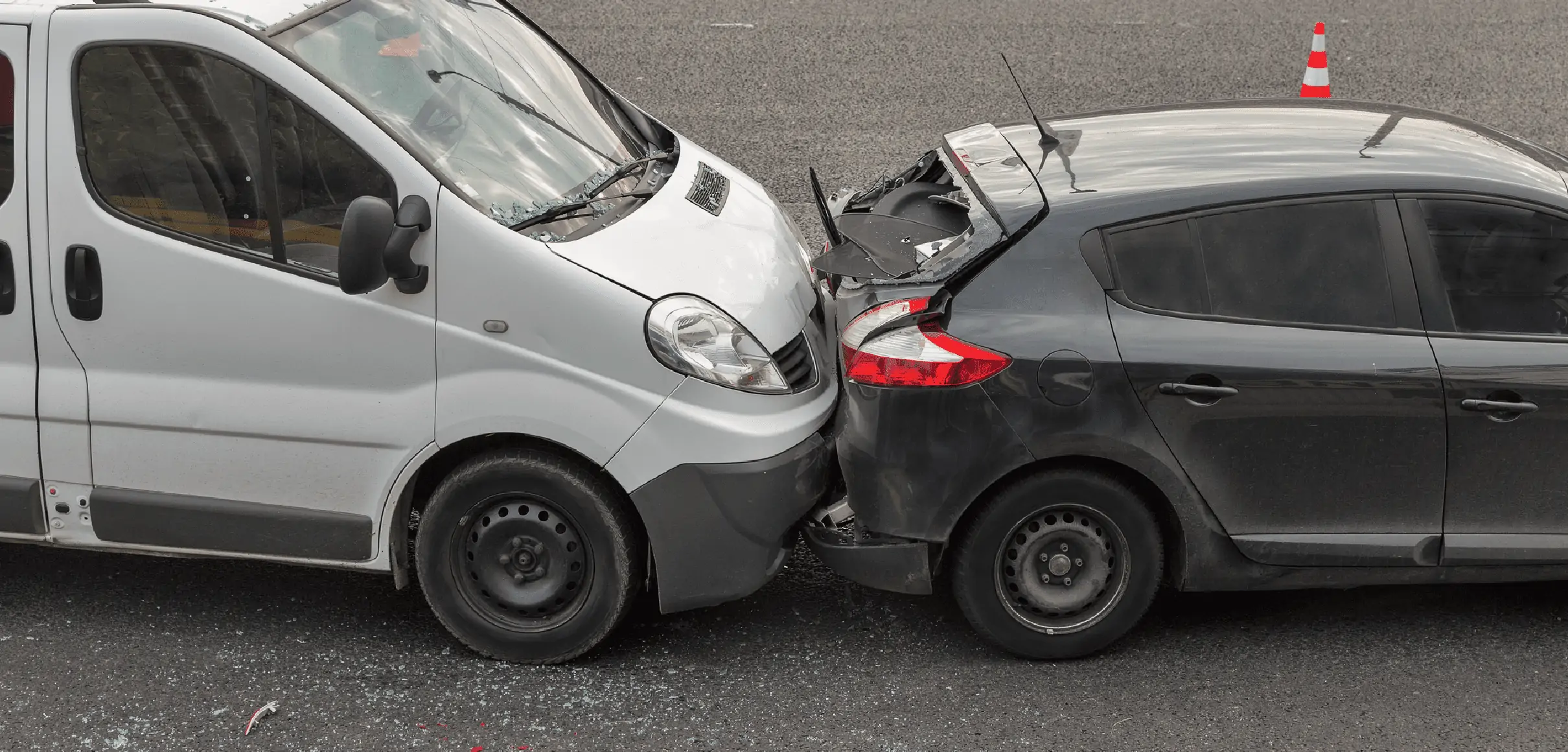Posted At: oct. 06, 2023 - 535 Views

If you just Googled, “I rear-ended someone” or “I got rear-ended,” you’re not alone.
Rear-end accidents are the most common traffic incident in the U.S. The National Highway Transportation Safety Administration reported a whopping 2,194,000 rear-end collisions in 2019 alone.

With so many accidents every year, we at Top’s Injury Law Group PLLC have built an extensive track record of successfully representing clients in rear-end crashes and know how to handle these cases.
Here’s what to do in a rear-end collision and other things you need to know to best protect your interests.
What Are the Major Causes of Traffic Collisions in Rear-End Accidents?
Common causes of vehicle collisions in rear-end crashes include:
- Speeding
- Tailgating
- Distracted driving
- Aggressive driving
- Driver fatigue
- Hazardous weather conditions
- Driving under the influence of drugs or alcohol

Common Injuries in Rear-End Accidents
Most rear-end collisions don’t result in serious injury. Common injuries from a collision in a rear-end scenario include:
- Whiplash
- Concussions
- Arm, wrist, and hand injuries
- Shoulder injuries
- Knee injuries
- Pinched nerves
- Back and neck injuries
More serious but less common injuries include:
- Broken bones
- Herniated disks
- Nerve damage
- Spinal cord injuries
- Brain injuries
What Is the Average Payout for a Rear-End Collision?
Unlike head-on and side-impact collisions, rear-end crashes usually cause relatively minor injuries, so average payouts range between $15,000 and $30,000.
The exact amount will depend on:
- The severity of the injuries and any property damage
- The insurance coverage of the parties
- The amount of the deductible
- Whether you were at fault or contributed to the accident in some way
You can look up “rear-end collision settlement examples” online to get an idea of how much your claim might be worth.
Determining Fault in Rear-End Accidents in Arizona
If you get rear-ended, who is at fault?
Under Arizona law, rear-end collisions are presumed to be the fault of the person driving the rear vehicle.
However, this is a rebuttable presumption, meaning that if the rear driver proves they didn’t cause the accident, the fault is assigned to the driver of the front vehicle.
If there is no evidence or witnesses, the fault is placed on the rear driver— regardless of who was at fault.
Arizona law presumes rear-end collisions to be the fault of the person driving the rear vehicle. However, this is a rebuttable presumption. If the rear driver proves they didn’t cause the accident, the fault is assigned to the driver of the front vehicle.
Does Where You Were Sitting in the Car During the Collision Affect Your Claim?
You can get compensation regardless of where you were sitting in the vehicle. If you were injured as a passenger, you might be able to make a claim against the driver at fault’s insurance or your policy, if you have one.
What If I Wasn’t Wearing a Seatbelt?
Arizona law allows you to make an insurance claim or file a lawsuit even if you were not wearing a seatbelt at the time of the accident. However, this may lower the compensation you are entitled to.
What to Do in a Rear-End Collision: 5 Steps to Take Immediately After the Crash
Take these steps if you are involved in a rear-end collision:
1. Check for Injuries and Seek Medical Attention
If you or someone else is injured, call 911 or go to the hospital and get it checked out immediately.
Getting prompt medical attention is essential for two reasons. First, it leaves a record of the injuries, which is helpful when seeking compensation. Second, some injuries like traumatic brain injury may not present symptoms initially but could result in serious complications later.
2. Call a Rear-End Collision Lawyer
Don’t assume the other driver is at fault or that insurance will take care of everything.
Your insurance may pay for the cost of repairing or replacing your vehicle. However, you still need to file a claim against the other driver for medical and other expenses.
Plus, even if the other driver is at fault, their insurer will likely try to avoid a payout. For instance, they may dispute liability for the crash or the value of your damages.
This is why it’s essential to speak with a lawyer as soon as possible. An experienced attorney from Top’s Injury Law Group PLLC can advise you on what to do in a rear-end collision, help you navigate the insurance process, and ensure that you get the compensation you deserve.
3. Contact Your Insurance Company
The standard time limit to report an accident is 30 days after the event. You should still check your insurance policy to ensure you don’t miss any deadlines.

4. Get a Copy of the Police Report
The police are required to respond to accidents resulting in serious injury, property damage, or death. If law enforcement gets involved, request a copy of the police report. It contains important details about the accident that can help build your claim.
5. Collect Evidence of Your Losses
To get maximum compensation, you need evidence proving the full extent of your losses, such as:
- Bills, receipts, prescriptions, benefits statements, travel expenses, and other documents related to medical care.
- Pay stubs, bank statements, and other paperwork showing the income you would have earned had the crash not affected your ability to work.
- Photos of your injuries, the vehicles, and the scene of the accident.
- A diary of your day-to-day symptoms, such as pain, emotional suffering, difficulty sleeping, mental health issues, etc.
What to Do in a Multi-Car Collision
If you were involved in a multiple-vehicle accident, do the following in addition to the steps above:
- Don’t get out of your car unless it’s safe to do so.
- Make sure your seatbelt is fastened in case your car is hit again.
- Once it is safe, get the contact details and insurance information of all parties involved.
What to Do If You See a Collision
If you witness a collision, remain calm and make sure you’re out of harm’s way. Pull over to a safe spot and turn on your hazard lights if you are driving. Then, call 911 and wait for help to arrive. Only move injured persons if they are in imminent danger, such as fire or oncoming traffic. Don’t render first aid unless you are qualified or the operators ask you to do so.

Rear-end Collision FAQs
Here are the answers to common questions we get in our practice:
What Kind of Evidence or Information Should I Collect?
Get the contact and insurance details of everyone involved. Ask for a copy of the police report and keep all paperwork related to any medical expenses, property damage, and other losses. You should also take photos of the vehicles and the scene of the accident.
What Do the Three Sequences of a Collision Include?
Every motor vehicle accident involves three types of collisions: vehicle, human, and internal. The first collision takes place when the vehicle hits an object, such as another car or a building. The second collision happens when the human inside the vehicle meets an object that stops the forward motion, such as a seat belt or a steering wheel. The third collision occurs when the human’s internal organs, which may still be moving even after the body has stopped, reach a point of impact. This can cause organs to bleed, fracture, or tear.
Should I Call the Police After a Minor Collision?
In the case of a minor rear-end collision, you’re not required to call the police. However, it’s a good idea to do so if you have insurance. The police will take a report, which can support your claim later.
Do I Need to Notify My Insurance?
You should notify your insurance company as soon as possible after a collision to get the maximum compensation available to you.
What Should You Immediately Do If You Are Involved in a Collision?
If you are involved in a collision, stay calm and make sure you are out of harm’s way. Call 911 and wait for help to arrive. Seek prompt medical attention if you are injured and contact an experienced rear-end collision lawyer as soon as possible.
Have You Been Involved in a Collision?
Even minor traffic accidents can be stressful and emotionally taxing. They also invariably take a toll on your budget.
The good news is that you don’t have to face these challenges alone. Our proven attorneys at Top’s Injury Law Group PLLC advise you on what to do in different types of collisions and how best to protect your rights.
Call us at (480) 470-2299 or contact us to learn what to do in a collision and get the compensation you deserve.
